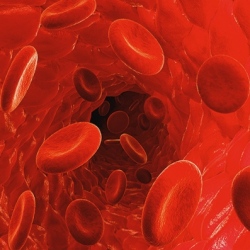
Scientists believe they are “tantalisingly close” to being able to make a “limitless supply” of blood to treat people with disorders and help give transfusions. For nearly 20 years, researchers have been trying to find a way to turn stem cells – which can create any kind of cell – into blood artificially.
Now a team of researchers has managed to create a mix of different types including blood stem cells that produced various different kinds of human blood cells when put into mice.
Dr Ryohichi Sugimura, a postdoctoral fellow at the Daley Lab in Boston Children’s Hospital in the US, said: “This step opens up an opportunity to take cells from patients with genetic blood disorders, use gene editing to correct their genetic defect and make functional blood cells.
“This also gives us the potential to have a limitless supply of blood stem cells and blood by taking cells from universal donors.
“This could potentially augment the blood supply for patients who need transfusions.”
And fellow researcher Dr George Daley, who heads the lab and is also the dean of Harvard Medical School, added: “We’re tantalisingly close to generating bona fide human blood stem cells in a dish.
“This work is the culmination of over 20 years of striving.
“We’re now able to model human blood function in so-called ‘humanized mice’. This is a major step forward for our ability to investigate genetic blood disease.”
A second team of researchers, led by Professor Shahin Fafii, of Cornell University, also managed to turn adult mouse cells into mouse blood stem cells.
And when mice whose immune system had been removed were given the blood stem cells, they regained immune blood cells.
If this could be reproduced in humans, it could provide a way of treating a range of immune disorders.
Both studies were described in separate papers in the leading journal Nature.
One potential problem with using stem cells in this way is the chance they could become cancerous.
Dr Caroline Guibentif, an expert at Cambridge University, who co-wrote a commentary in Nature about the two research papers, stressed that both represented a “a huge breakthrough”.
“People have been trying to do this for 20 years unsuccessfully,” she told The Independent.
“This is the first time … they have got cells that can self-renew and give rise to all sorts of blood cells, so of course it’s a big step towards the goal, but we are not quite there yet.”
She said both teams had turned ordinary cells into blood stem cells using genetic techniques.
